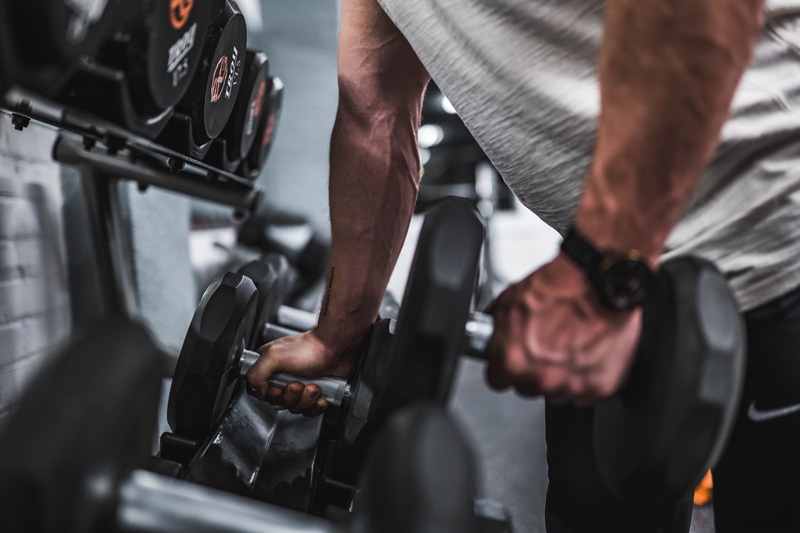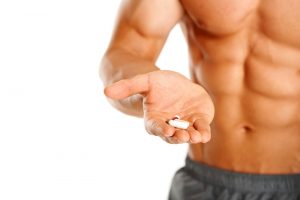If you’ve hung out with a few bodybuilders lately, you’ll be well acquainted with the (often confusing) world of bodybuilding slang. One term you’ve probably heard by now is: IGF-1.
IGF-1 is a common topic in bodybuilding circles. It stands for insulin like growth factor 1, an anabolic hormone that stimulates the growth of bone, muscle and other important tissues.
So why is IGF 1 bodybuilding such a big deal? Put simply, it works to stimulate muscle volume and muscle mass, making a crucial factor in building muscle and sculpting your body composition.
Insulin like growth factor also influences the biological ageing of cells, as well as insulin sensitivity. But how is IGF 1 produced? And why can’t bodybuilders stop raving about it?
But first, let’s talk a little about peptides.
What are peptides?
Peptides are commonly used in the bodybuilding community to support muscle growth and enhance performance. One of particular interest in growth hormone secretagogues (GHS).
Peptides are often seen as a slightly more natural alternative to typical anabolic steroids. Many users rave about their ability to boost muscle mass, enhance fat loss and maximize their workouts.
Put simply, peptides are short chains of amino acids, which form the building blocks of proteins and peptides. These naturally exist in your body, and are often sourced from foods including:
- Meat
- Fish
- Dairy
- Eggs
- Lentils
- Beans
- Whole grains
Since these short chains of amino acids are involved in a variety of your body’s processes, including the production of hormones, they’re pretty useful for muscle mass growth. Typically, peptide supplements are sold as a powder that is mixed with liquid, or in injectable form.
Specific peptides may also help boost the release of hormones known to encourage muscle growth, fat loss and improve workout recovery and workout performance.
But why are they so popular in the bodybuilding community?
Human growth hormone

Yep, it’s all about human growth hormone (HGH). If we go back to peptides for a moment, it’s important to pay attention to growth hormone secretagogues (GHS) which stimulate the production and release of human growth hormone.
Also Read: YK11 SARM: How it works and what to expect
Growth hormone (GH) works to enhance muscle growth, while also promoting fat loss. While many bodybuilders don’t necessarily have a GH deficiency, a boost of human growth hormone can stimulate the liver into releasing insulin like growth factor 1 (IGF 1).
What happens is somewhat a knock-on effect! IGF 1 then triggers muscle protein production, therefore boosting actual muscle growth.
In the 1980s, human growth hormone (HGH) was widely used to enhance performance across professional athletes and bodybuilders. However, from 1989, the International Olympic Committe banned the off-label use of human growth hormone.
Why use GHSs instead?
Growth hormone secretagogues (GHS) are believed to offer many of the benefits of human growth hormone (HGH) without as many side effects, according to users.
Peptide types for bodybuilding

As we touched upon above, bodybuilders are commonly most interested in growth hormone secretagogues (GHS). The most popular include:
- Growth hormone releasing hormones: including sermorelin, tesamorelin, CJC-1293, and CJC-1295
- Grehlin and compounds mimicking its effects: such as lenomorelin, anamorelin, ipamorelin, macimorelin, and tabimorelin
- Growth hormone releasing peptides (GHRPs): such as alexamorelin, GHRP-1, GHRP-2, GHRP-3, GHRP-4, GHRP-5, GHRP-6, and hexarelin
Without delving into too much detail, each of these peptides works to stimulate the production and release of human growth hormone, however, they may do so in different ways.
But before you go shopping for GHSs, it’s important to note there are currently no studies to date on their effects.
Put simply: GHS peptides work to stimulate the release of growth hormones. And growth hormone encourages solid muscle gain.
Is IGF 1 a peptide?
IGF 1 is a small peptide, consisting of around 70 amino acids. IGF 1 is primarily known as a hormone that works as the mediator of growth hormone. When insulin like growth factor and growth hormone come together, they promote health growth of bones and tissues.
Are GHSs safe?
Based on the current research available, the safety of GHSs – both in the short and long term – is rather unknown. Let’s just say there is plenty of room for further research in this area.
According to users, common side effects of GHS may include:
- Increased appetite
- Heightened blood sugar levels
- Fluid retention
Alongside this, they may also lower the body’s sensitivity to the hormone insulin, making it harder to regulate and maintain normal blood glucose levels.
How is IGF 1 produced?
Predominantly produced by the liver (around 75%), IGF 1 is produced in response to the release of growth hormone – which itself is released in response to food, sleep and exercise.
The quantity of IGF 1 released via the liver then circulates through your blood stream. This is why it is often referred to as circulating IGF 1 or cIGF 1.
Most other tissues (including your muscle tissue) secrete IGF 1. Unlike the widely circulating cIGF 1, this type targets locally on nearby tissue.
IGF 1 and building muscle

In order for hypertrophy to take place, the rate at which muscles build proteins (called muscle protein synthesis) must be greater than the rate at which they break them down.
The reason why insulin like growth factor is so popular in bodybuilding is due to the way IGF 1 hormone binds to IGF 1 receptors of tissues, in which it:
- stimulates molecules that switch on the production of proteins (such as mTOR)
- inhibits molecules that are responsible for the breakdown of proteins (such as FoxO-1).
Put simply, IGF 1 have a positive impact on both ends of protein synthesis – leading to hypertrophy and muscle mass growth.
Furthermore, insulin like growth factor 1 also benefits muscle growth by activating specialized muscle cells, referred to as satellite cells.
Also Read: How does food impact strength training?
This means that those with higher levels of insulin like growth factor 1 will likely find it easier to build muscle mass.
What about IGF 1 and ageing?
As we touched upon earlier regarding insulin like growth factor 1 and the body’s cells, some animal studies have suggested that increased levels of IGF 1 could benefit muscle protein synthesis and accelerate cell division and death – central parts to the ageing process.
Alongside this, fasting and calorie restriction – which have been shown to delay cell ageing and improve lifespan – may also have the ability to reduce circulating levels of IGF 1 in people.
IGF 1 and insulin sensitivity
IGF-1 can also increase tissue sensitivity to insulin, leading to greater glucose uptake from the bloodstream. It does this by binding to a special “hybrid” receptor, aptly called IGF-1 / hybrid insulin receptor.
However, the relationship between circulating IGF-1 and insulin sensitivity remains complicated because IGF-1 also inhibits growth hormone, which itself promotes insulin function.
Current evidence from clinical trials suggests that low and high IGF-1 levels may lead to poor insulin sensitivity.
IGF 1 benefits in bodybuilding

As an anabolic hormone, IGF 1 works to stimulate bone, muscle and other tissue growth. It plays an important role in muscle mass building, with users reporting solid muscle gain.
Alongside this, IGF 1 can promote the loss of body fat, helping you to keep your muscle mass while cutting fat.
It’s no surprise that hormones with anabolic properties, such as growth hormone (GH), insulin like growth factor 1 (IGF 1) and insulin are used by professional athletes and bodybuilders looking to enhance physical ability and body composition. Skeletal muscle is critical for execution of movement – with skeletal muscle mainly regulated by nutrition, exercise, hormones, genetics and even ethnicity.
Benefits of IGF 1:
- Protein synthesis
- Fat storage is channelled for energy production, resulting in fat loss
- Positive metabolic effects
- Increased lean body mass and lowered fat levels
- Improved cognitive function
- Boosts hyperplasia in muscle cells, leading to fuller muscle tissues
GF 1 vs Human growth hormone
Growth hormones don’t necessarily cause direct muscle growth, however, they do facilitate muscle growth by signalling the release of IGF 1.
Can you be prescribed human growth hormone?
Technically, yes, but not in a bodybuilding setting. Human growth hormone will only be prescribed if you are diagnosed with Adult Growth Hormone Deficiency Syndrome.
Also Read: MK-677 side effects: Ibutamoren Benefits, Uses, Dosage (SARMS)
Much like many anabolic steroids, HGH deficiency is the real reason for its use – not bodybuilding.
Is there an IGF 1 growth hormone supplement?
As we talked about above, growth hormone treatment is kept aside for those with true growth hormone deficiency.
Insulin like growth factor 1 isn’t prescribed outside of a diagnosis of growth hormone deficiency. Low GH levels can lead to a prescription of human growth hormone, however, it is unsafe to be used recreationally.
IGF 1 growth hormone supplements have been linked to some pretty serious side effects, including:
- Joint pain
- Headaches
- Acne
- Hormone dysfunction
- Increased risk of cancer
- Low blood glucose levels
- Swelling of the extremities
- Heart enlargement
IGF 1 and weight loss
Increasing IGF 1 levels is also of interest to those who want to burn fat. Although the potential boost to growth hormone is of greater interest to those wanting to build muscle and burn fat.
Overall, supplementation of IGF 1 isn’t recommended for weight loss due to a lack of evidence and the likelihood of side effects.
IGF 1 and cancer research
Just as IGF 1 helps key cells reproduce and survive, it also promotes growth and survival in unhealthy cells. In addition to promoting cell growth, IGF 1 inhibits apoptosis (programmed cell death) – potentially making it easier for cancer to spread throughout the body.
Some studies have explored treatments for cancer aimed at altering IGF 1 activity, but more research is needed.
So, is IGF 1 safe?
It’s crucial to have a healthy balance of IGF 1 (insulin like growth factor 1) and growth hormone – as this is critical to human growth and development. Abnormal levels of IGF 1 can lead to a variety of health concerns, including:
- A rare condition known as acromegaly (gigantism)
- While very low levels can cause a condition called Laron Syndrome (dwarfism), typically diagnosed in childhood
- Both chronically high and low levels of IGF 1 can increase risk of death in adults
A little more on insulin like growth factor 1…
Did you know that IGF 1 is produced throughout your life? However, it typically peaks during puberty. Normal levels of IGF 1 are crucial for body growth and other key bodily functions. However, many look to increase insulin like growth factor 1 after reading about its potential to boost longevity and enhance muscle growth.
How can you test IGF 1 levels?
This can be done via simple blood samples. A growth hormone deficiency is most commonly diagnosed during childhood – and recognised in children who appear to be growing more slowly.
IGF-1 is measured in nanograms (ng) per milliliter (mL). Normal values vary based on age and sex:
- Ages 0-10: 14-495 ng/mL
- Ages 11-17: 17-633 ng/mL
- Ages 18-55: 37-245 ng/mL
- Ages 55+: 25-232 ng/mL
A doctor will typically check for growth hormone deficiency when when they suspect growth abnormalities, pituitary dysfunction or malnutrition.
Can you boost human growth hormone levels, naturally?
Yes, you can. There’s no need for dangerous performance enhancing drugs, such as peptides and insulin like growth factor 1 (IGF 1).
If you believe you have a growth hormone deficiency, there are ways to boost this crucial hormone. Especially if you’re focused on muscle growth.
We actually just wrote about this very topic: Natural ways to increase human growth hormone.
Why risk it?

With so little research completed in this area, is IGF 1 worth the risk? While many bodybuilders seek ways to increase human growth hormone – especially with many boasting about the power of insulin like growth factor 1 – the potential side effects aren’t worth it.
There is another way to maximize your time in the gym and boost muscle protein synthesis… Here at Brutal Force, we have carefully developed 100% safe and legal steroids and SARMs alternatives. Whether you’re cutting or bulking, our legal steroids can help you SMASH your goals in no time.
















